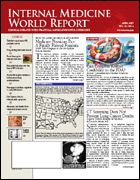Publication
Article
Internal Medicine World Report
Aspirin Resistance Is Real, Worsens Vascular Disease Outcomes
Author(s):
From the International Stroke ConferenceAssess All Patients before Prescribing Antithrombotic Therapy
.
SAN FRANCISCO—Aspirin resistance is a real phenomenon that greatly increases the risk of adverse outcomes among patients with cardiovascular (CV) or cerebrovascular disease, according to data presented at the 2007 International Stroke Conference
In a meta-analysis of 17 studies involving 2367 patients with vascular disease, 618 (26%) were identified as aspirin resistant using various platelet function assays, said lead investigator George Krasopoulos, MD, of the Royal Brompton Hospital, London.
Aspirin resistance was defined as a demonstrative platelet response to specific stimuli, despite aspirin therapy, and aspirin sensitivity was defined as the expected inhibitory platelet response to specific stimuli with aspirin therapy. Men were 65% more likely to be aspirin resistant than women.
P
P
A total of 40.6% of the aspirin-resistant group and 16.8% of the aspirin-sensitive group had a new CV event while taking aspirin, which represented an adjusted odds ratio of 4.10 (<.001). The risk of death was 6-fold greater in the aspirin-resistant patients compared with the aspirin-sensitive ones ( <.003).
P
“We tested different doses of aspirin, and the value was still significant, so the patients who were aspirin resistant had more events, even on different doses,” said Dr Krasopoulos. “Having said that, the number of studies using 75 to 100 mg of aspirin was 2, and the number using 500 mg was only 1. Most of the studies [9] used 325 mg/day of aspirin.”
He noted that the aspirin-resistant patients who were also taking clopidogrel (Plavix) still suffered an excess number of events compared with the aspirin-sensitive patients. The study was not designed to assess combination therapy, he added.
“Although aspirin therapy may be effective overall in the treatment of cardio- and cerebrovascular-related diseases in a wide range of patients, not all patients benefit,” said Dr Krasopoulos. The implication is that all patients prescribed aspirin as antithrombotic therapy should be assessed for aspirin-resistance status, he added.
“We have to see whether increasing the doses, increasing the frequency, giving aspirin in combination with clopidogrel, or using higher doses of clopidogrel may have an effect. It’s something we should look at.”
In another study, investigators at Yeungman University Hospital in Daegu, Republic of Korea, found that 30 (12.8%) of 234 consecutively enrolled patients taking aspirin for secondary prevention of ischemic stroke were nonresponders, based on a point-of-care platelet function assay. Of those taking a low dose (100 mg/d) of aspirin, 26.1% had an ineffective response, whereas aspirin nonresponse was only 7.5% and 7.1% in those taking 200 mg/day or 300 mg/day, respectively, said lead investigator Soo Joo Lee, MD.
In a third study, point-of-care platelet function tests found that while aspirin resistance is relatively uncommon, clopidogrel resistance occurs in nearly one fourth of patients undergoing cerebral stent replacement. This was reported by researchers at Rush University in Chicago.
In studying patients who had cerebrovascular stents, only 3 of 77 who were taking aspirin before stent placement were found to have aspirin resistance, whereas 14 (23.7%) of 59 who were treated with clopidogrel before stent placement had clopidogrel resistance. No correlation was found between the clopidogrel dose and the level of platelet inhibition in the clopidogrel recipients.
Key points
• About 25% of patients with vascular disease are aspirin resistant.
• Men are 65% more likely than women to be resistant.
• Those with aspirin resistance were 6 times more likely to die.
• Assess all patients for resistance before prescribing antithrombotic therapy.





